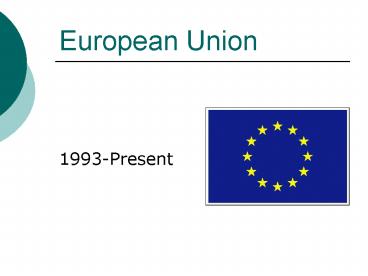European Union PowerPoint PPT Presentation
1 / 28
Title: European Union
1
European Union
- 1993-Present
2
EU Countries
3
Name famous places in France.
- The Louvre
- One of the largest museums in the world
- Houses, arguably, the most precious art pieces
- The Eiffel Tower
- Built for the 1889 Worlds Fair
- Most visited (paid) monument in the world
4
(No Transcript)
5
Name famous places in the UK.
- Tower Bridge
- Suspension and draw bridge good luck
- Big Ben
- Second largest four-faced clock tower in the
world - Renamed Elizabeth Tower in 2012
- Stonehenge
- Built in 2400-2200BCE
- Mystery!
6
(No Transcript)
7
Name other famous places in Europe.
- Roman Colosseum
- Built in 70-80CE
- Leaning Tower of Pisa
- Dont build on soft ground especially in the
1100s - Sagrada Familia
- Barcelona, began to build in 1882still not
finished - Parthenon
- Athens, built in 438BCE
- Trevi Fountain
- Rome, largest Baroque fountain in the world
8
(No Transcript)
9
Why was the EU created?
10
Reaction to WWII
- Europes competition and divisiveness created
animosity which led to war. - If the countries of Europe are more dependent on
one another, the likelihood of more violence and
war decreases.
11
Tariffs
- What is a tariff?
- How might tariffs cause conflicts between
countries?
12
Begins in 1957
- Treaty of Rome
- Common market European Economic Community
- Elimination of tariffs
- Forge a common agricultural policy
- Promote and monitor nuclear energy European
Atomic Energy Community
13
Widening and Deepening
- Widen
- Geographic expansion
- Deepen
- Remove barriers
- Increase degree of integration
14
Formalizes in 1993
- Maastricht Treaty
- Goals of the European Union
- an economic and monetary union (Euro)
- a common foreign and security policy
15
Expansion of the EU
- Dublin Constitution
- appointment of an EU president
- appointment of an EU foreign minister
- Legislation would be approved by both the
appointed Council and the elected European
Parliament - ?DEFEATED IN RATIFICATION ?
16
Fear of the EU
- Why was ratification defeated?
- economic issues and fear
- unease over a growing number of immigrants
- erosion of national identity
- democratic deficit most leaders were appointed
17
Lisbon Treaty, 2007
- New treaty created with some of the
Constitutional issues resolved - Needed ratification of all 27 members
- Ireland sent it to the voters, they rejected it.
- But ratified it a year later, with some changes.
18
Governing the EU
- What does the US government look like?
- Draw a picture or diagram depicting how our
government works
19
Governing the EU
- European Commission
- Qualified majority voting weighted votes
according to population - European Parliament
- European Court of Justice
- National vetoes removed in some policy areas
- No reference to a flag or anthem
20
Entry Task
- Answer each item in your notes
- What is our economy dependent upon?
- What are some of the labor laws we have developed
over the last 150 years? - Please describe the US economic philosophy.
21
Eurozone
- Those member nations that use the Euro
- Not including the largest economy in Europe
United Kingdom - Intended to create a stable economic powerhouse.
- Specific financial criteria
- That no one really paid attention to
22
Economic Crisis
- Exposed weaknesses in EU
- European governments in too much debt
- Inconsistent fiscal policies in member nations
- Inability of the EU leaders to react quickly
- Inability of the European Central Bank to do what
the FED did
23
Entry Task
- Define in your notes
- capitalism
- socialism
- mixed economy
24
Economic Crisis
- Greece
- Widespread tax evasion
- Massive spending with borrowed money
- Italy
- Enormous national debt
- Ireland
- Under-regulated banks
- Spain
- Real-estate collapse
- Led to 22 unemployment
25
Economic Crisis
- Germany
- Largest economy in the Eurozone
- Dependent upon trade surpluses sustained by the
debt-ridden, high consuming EU members - Inability to borrow money
- Greece, Ireland, and Portugal
- BAILOUTS
- With austerity measures to reduce deficit
26
Austerity Measures
- Increase taxes
- Decrease government spending
27
Strong Labor Unions
- Europe has a history of strong labor unions
- Like the U.S., the acceptance of labor unions
kept most of those countries from communist
revolutions - Labor union power has increased over the last two
decades
28
Strong Labor Unions
- France
- Difficult to fire anyone
- Blamed for increased unemployment
- Led to Paris law allowing anyone under 26 to be
fired within the first two years of employment
for any reason - Greece
- Difficult to fire anyone
- 80 paid holidays throughout the year

